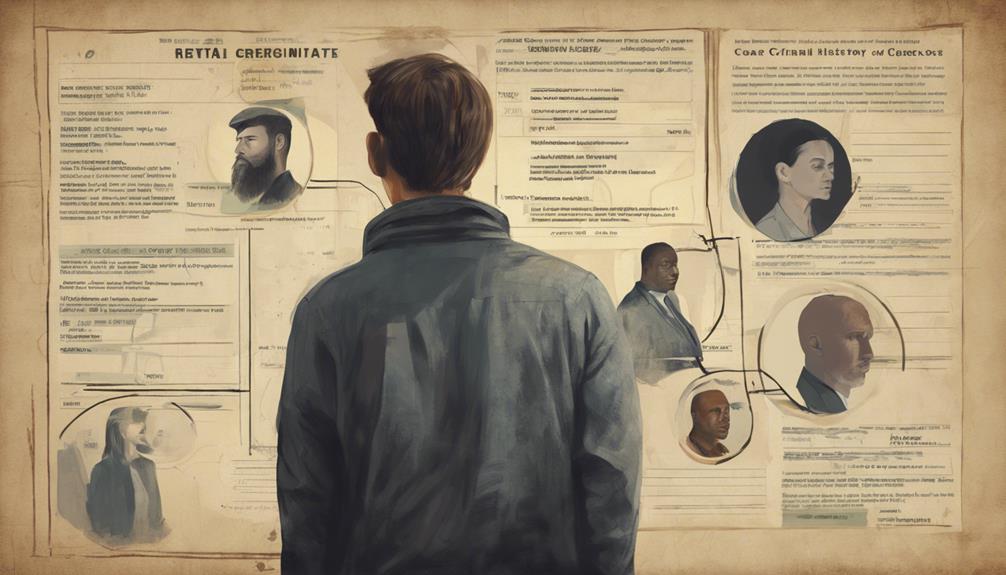Employers should keep background check records on file for at least six years per federal and state laws. This period guarantees legal compliance and minimizes potential risks. Adhering to guidelines also safeguards against liabilities and aids in resolving disputes. Storing records securely protects sensitive information and maintains transparency. Extending retention beyond six years may be necessary based on individual state regulations. Understanding and following these requirements are important for employers to stay compliant and accountable.
Key Takeaways
- Retain background checks for at least six years post-employment.
- Compliance with state laws may require longer retention periods, up to seven years.
- Securely store records to protect sensitive information.
- Regularly review and update record retention policies for compliance.
- Consult legal counsel for guidance on best practices.
Legal Compliance and Regulations

For legal compliance and adherence to regulations regarding background checks, employers must keep records for specified durations as mandated by federal and state laws.
Federal requirements, such as those by the U.S. Equal Employment Opportunity Commission (EEOC), dictate that background check records should be retained for at least one year after an employment action.
The Fair Credit Reporting Act (FCRA) doesn't specify a retention period for background check reports; however, industry best practices recommend keeping them for a minimum of six years to guarantee compliance.
Additionally, states may have their own regulations on background check record retention, with some extending the period to up to seven years. Employers are advised to keep these records for a minimum of six years to address potential statute of limitations extensions and safeguard against legal claims.
Handling Background Information
Employers must ethically handle background information and consistently apply standards to all applicants. It's important to comply with regulations such as the Fair Credit Reporting Act (FCRA) and guidelines set by the Equal Employment Opportunity Commission (EEOC) to ensure the proper handling of background check information.
Here are some key points to keep in mind:
- Exceptions may apply for disability-related background issues in accordance with the FCRA.
- Adherence to FCRA requirements for adverse actions, notices, and report copies is vital.
- Employers should follow record retention requirements from the EEOC and Federal Trade Commission (FTC).
- Proper disposal of background reports is necessary to avoid FCRA violations.
- Retaining records for a specified period is essential for compliance and ethical handling of background information.
Recordkeeping and Disposal

Employers must understand the importance of retaining background check records for the required period to comply with EEOC and FTC guidelines.
Ensuring secure disposal practices not only protects applicant privacy but also aids in maintaining compliance with FCRA regulations.
Keeping background check records separate from personnel files is essential for safeguarding sensitive information and upholding privacy standards.
Retention Period Importance
Effective recordkeeping and timely disposal of background check records are essential components of ensuring compliance with legal requirements and minimizing potential risks for businesses. Retention periods for background checks play a pivotal role in safeguarding against liabilities and ensuring legal compliance.
Here are some key points to keep in mind regarding the importance of retention periods:
- Retaining background check records is vital for meeting legal requirements and avoiding potential litigation.
- Best Practices for retaining background check files recommend keeping records for at least six years.
- Adhering to specific retention periods demonstrates a commitment to compliance with state and federal laws.
- Maintaining records for the designated retention period safeguards against potential FCRA claims.
- Employers need to understand the legal requirements for retaining background check records to mitigate risks and protect both employees and the organization.
Compliance With Regulations
Compliance with regulations regarding recordkeeping and disposal of background check information is vital for businesses to uphold legal requirements and protect applicant privacy. The Equal Employment Opportunity Commission (EEOC) mandates that employers retain background check records for at least one year after an employment action.
The Federal Trade Commission (FTC) provides guidelines on proper disposal methods for background reports to safeguard applicant privacy. Additionally, businesses must adhere to Fair Credit Reporting Act (FCRA) requirements for retaining background check records to avoid legal implications.
Ensuring compliance with these regulations is essential not only for transparency and accountability but also for upholding antidiscrimination laws enforced by the EEOC. Secure disposal of background reports is paramount in preventing unauthorized access and protecting sensitive applicant information.
Secure Disposal Practices
When implementing secure disposal practices for background check records, it's essential to prioritize the shredding of paper copies and the secure purging of electronic records. Mark confidential employee data for secure destruction and store hard copies securely until no longer needed.
Electronic records should undergo periodic review and purging to comply with data protection regulations. Implement a Litigation Hold issued by the General Counsel's office to prevent accidental destruction of records during legal proceedings.
Failure to comply with secure disposal practices can result in sanctions, as courts have the authority to impose penalties for non-compliance.
- Mark confidential employee data for secure destruction.
- Store hard copies securely until no longer needed.
- Periodically review and purge electronic records.
- Implement a Litigation Hold to prevent accidental destruction.
- Courts can impose penalties for non-compliance.
Further Information and Resources
What additional resources can assist employers in understanding and complying with background check record retention requirements? Employers seeking guidance on how long to retain background check records related to hiring can benefit from professional assistance and extensive resources. The Employment Opportunity Commission (EEOC) mandates employers to keep these records for at least one year post-employment decisions, while various state laws may require longer retention periods, up to seven years in some cases. The Fair Credit Reporting Act (FCRA) also plays a pivotal role, although it does not specify a retention timeframe, suggesting around six years is a best practice. For a deeper understanding and compliance with state laws and FCRA requirements, employers can turn to professional guidance for expert advice. Below is a table summarizing key points related to background check record retention:
| Resource | Description |
|---|---|
| EEOC Guidelines | Mandates a minimum of one year retention for background check records post-employment action |
| State Laws | Some states require retention of these records for up to seven years |
| FCRA Recommendations | Best practices suggest keeping background check reports for around six years |
Educational and Compliance Assistance

Employers can access educational resources to guide them in understanding and adhering to background check laws and regulations. These resources focus on preventing deceptive business practices and ensuring legal compliance in the realm of background screening.
The emphasis is on educating employers to avoid unfair practices and treat applicants equitably, covering aspects like social media usage and interpreting background screening reports under the Fair Credit Reporting Act (FCRA).
Joint publications by entities such as the Employment Opportunity Commission (EEOC) provide guidance on legal compliance and preventing fraudulent practices in background checks.
Retention Period for Employee Background Check Records
The retention period for employee background check records is determined by federal and state laws, varying based on the information collected and the location of the employer.
Employment regulations, such as the Fair Credit Reporting Act (FCRA), outline the importance for employers to maintain these records for a specific duration post-employment. While federal law mandates a minimum retention period of one year, states may impose longer requirements, extending up to seven years beyond termination in some cases.
Compliance with the FCRA and state laws is essential in determining the appropriate length of time to keep background check records on file. It's advisable for employers to retain these records for at least six years post-employment to guarantee coverage for potential statute of limitations extensions and to meet legal requirements.
Adhering to these guidelines helps companies maintain compliance and safeguard against any legal implications related to background check record retention.
Frequently Asked Questions
Should Background Checks Be Kept in Personnel Files?
Background checks should not be stored in personnel files. Keeping them separate guarantees confidentiality, compliance, and reduced risk of unauthorized access or discrimination claims. This practice also enables easier review during audits, maintains data protection, and privacy commitments.
How Far Back Do Most Employers Go for Background Checks?
Most employers typically go back 7-10 years for background checks, but industries like finance or healthcare may require 15 years. The timeframe is influenced by the position and state laws, balancing thoroughness with compliance.
When to Destroy Employee Records?
Organizations should securely destroy employee records in compliance with data protection regulations. Clear policies, regular audits, and technology like digital solutions aid in maintaining accurate, up-to-date, and securely stored records, ensuring ongoing compliance.
How Long Do You Need to Keep Direct Deposit Forms?
To comply with regulations, employers should keep direct deposit forms for at least one year post-employment. Some states might require retention for up to seven years. Safeguarding these forms is essential for resolving payment disputes and audits.
What is the Standard Timeframe for Keeping Federal Background Checks on File?
The standard timeframe for keeping federal background checks on file varies depending on the agency and the specific requirements. Some agencies may keep federal background checks on file indefinitely, while others may only retain them for a certain period, such as five or ten years. It’s important to research each agency’s specific policies to understand the federal background checks depth.
Conclusion
To wrap up, it's essential for organizations to properly manage and retain background check records in compliance with legal regulations. But how long should these records be kept on file before they're disposed of?
By following guidelines and best practices, employers can guarantee they're maintaining a safe and secure workplace while also safeguarding the privacy and rights of their employees.









